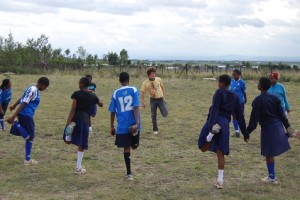You arrive as a volunteer your first time, and everything—especially you, yourself—is a mystery; you are a whole other world in your own process, coming into a community in its own process. When you arrive as a volunteer for the second time, you are embraced into that community without hesitation; they are sprinting to give you hugs in fact.
I was completely overwhelmed when I returned to the Daraja campus the other day. It had been two years since my first visit, and it wasn’t only the girls I knew from before who rushed to embrace me and welcome me back, but all of the girls from the other forms as well. It was sensational to feel the immediacy of the school’s energy like that.

I helped referee the game with one of Daraja’s finest associates, Mr. Rutere, the handiest of handymen, and I couldn’t help but to be distracted by my thoughts: “We’re better than these other girls… look at all the staff and other students standing around cheering ALL the girls on. Look at these younger Daraja girls–how good they are at football and how they play with the Form 3s who I used to play with on days like today.” I wondered what the girls from the other school thought when they came onto the Daraja campus, were beaten by our girls, and looked around to see the supporting community and the beautiful grounds, out in the bush, away from the hustle and sounds of the town? There must have been some envy, but how is it possible? Just two years ago we were in constant worry over how to see that the school even survived.
As the sun was setting on the Daraja campus, I enjoyed another nutritious, hot meal while getting to know the other volunteers. Everyone was happy. I was happy. I am at home…just as Jason says. I decided to walk up to Andy’s rondavel, one of the thatch-roofed buildings on campus that staff and volunteers stay in—as was routine practice during the nights of my last visit to enjoy his company and catch up.
As we sat on the couch catching up, Andy got a call on his cellphone. I could hear him answering questions about applications. Once he got off the phone I asked him who it was, thinking that he had been talking to another interested volunteer. He said, “It was one of the girls from the school we played today, asking how she can apply to Daraja.”
My friends, what we have on our hands over here, on this plot of land outside of Nanyuki, Kenya, is a school. No, not just a school; it is a scholarship school for secondary girls who would otherwise not be able to continue their education. It has three forms of girls, and room for one more, but is already competing in voice and speech on the provincial level in Kenya, as well as sports on the regional level. It has a competent, hardworking staff of Kenyan teachers, and a sense of community and commitment. Girls whose families can afford to send them to other secondary schools want to come to Daraja.
